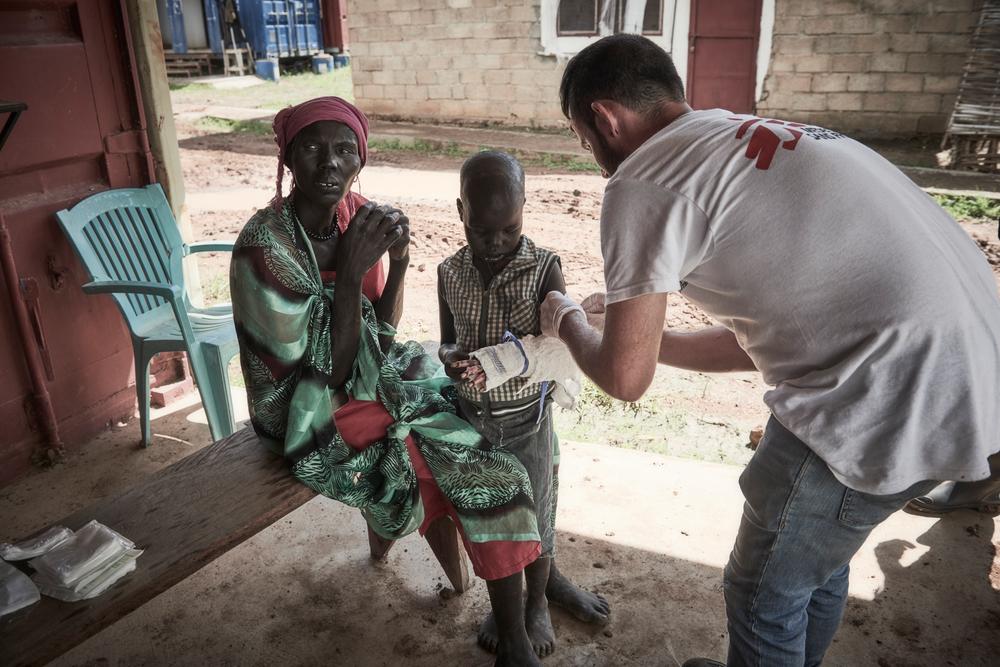Since February 2023, thousands of people have been displaced by outbreaks of violence in the Abyei Special Administrative Region. Maarten Bullens was in the project in August 2022 to help the teams scale up assistance to people who have taken refuge in informal camps or with local communities in Abyei town.
"It's 6am, it's raining heavily, and we are about to hit the road. It's not going to be fun because in South Sudan the roads are dirt. And when it's the rainy season the ground turns to mud and our cars sink. Every 150 metres we have to get out and help push the car to get out of the mud. The hours go by, we don't see the end of this journey. Five hours later, we finally arrive at the runway. A small plane is waiting for us to take the thirty-minute flight to Agok.
Once we land we take a car with Makuei Duop Deng, the support to the head of mission at that time, to reach the hospital that MSF had to abandon when violence broke out in February 2022 in the city and people fled. We had been told that people had returned to the town, but we were not sure, we wanted to go and assess.
Malnourished and in Pain: The Story of Hoth
It is 11.30 am and we meet the various community leaders and families living in what is still somewhat of a ghost town. One of them, aware that MSF staff are present that day, comes to ask for help. That's how I meet Hoth, a boy I would say is five or six years old. In reality he is seven, but being malnourished, he looks smaller than he is. Yet it is not because of malnutrition that the family is seeking care, but because Hoth has a burn on his left arm and chest from a month ago. But because there is no hospital available in the area, the nearest being the one we support in Abyei, he has only been able to receive traditional medicine which has not healed him. His arm is now infected and he has lost the use of his hand.
During the discussion with his family I learn that the malaria he contracted at the age of two has left him with irreversible brain damage. He no longer recognises his family members and suffers from regular seizures. It was during one of these that he fell into the fire over which the meal was cooking.
The situation is complex, as we did not come to Agok to evacuate or transport patients, but to assess the health situation there. Nevertheless, I am touched by the distress of this family and as a health worker, I cannot leave a patient in this state without care. However, taking a child and a caretaker to a health facility dozens of kilometres away is not self-evident and has major consequences for the family and the community. Many things have to be weighed in the balance, including the fact that if you can provide the outward journey, you may not be able to make the return journey. And in unstable environments with volatile security, recurrent flooding and limited means of communication, the choice to leave even for obvious health reasons is not easy.
After discussions with the family and community representatives, the decision was made and we prepared to leave with Hoth and his mother, with the father staying with the other children. In this community there are only a few mobile phones. That day, one of them is given to Hoth’s mother, so that she can keep in touch a little. It is through stories like this one that we can see how much care-seeking sometimes means great sacrifices for families.
Hoth Kuol Juol and his mother at the hospital [©Christina Simons]
A Smile of Relief: A Young Boy's Road to Recovery in Abyei
At 2 pm, we leave. The journey to the hospital is worse than this morning, as Hoth and his mother are taking the car for the first time, they are worried and have motion sickness. In addition to the forced stops because of the mud we make extra stops to allow them to breathe. The hours on the road feel endless. At 8 pm we finally arrive at Ameth-Bek hospital in Abyei where Hoth is immediately taken care of.
The next day, I find the little boy with a bandage around his arm, to ensure that the wound cleaned the day before does not become re-infected. I also find a smile on his face and that of his mother. In a moment like this, you can be reminded that despite the dramatic realities we see on a daily basis we continue to do this humanitarian work, so that on the patients and their families faces anxiety gives way to smiles and healing.
It is through stories like this one that we see how seeking care sometimes involves great stakes for families.”
Based on an interview with Maarten Bullens, emergency team nurse
Conducted at the end of 2022 by Florence Dozol, outgoing intersectional Field Communications Manager in South Sudan
